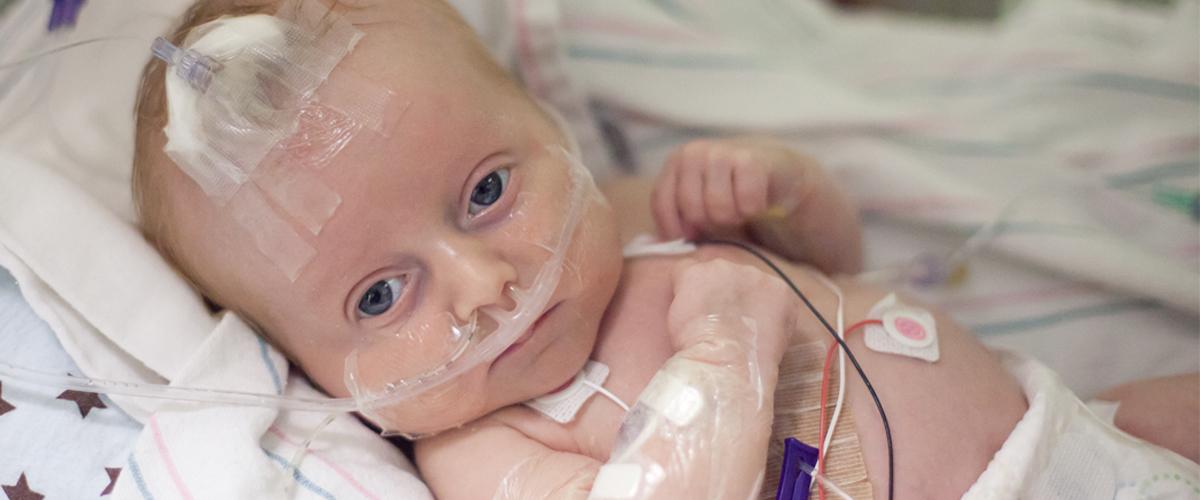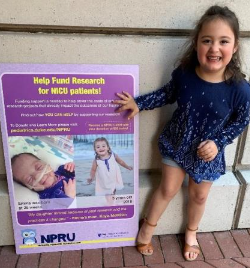

Dedicated to improving the outcomes of our babies.
The Neonatal Perinatal Research Unit (NPRU) explores causes, preventative measures, and treatments for many of the major negative health outcomes that impact premature and full-term infants. Our research is focused on both improving the care that we provide to these newborns and continuing to explore new therapies and treatment options.
How you can help
Our mission is to provide the professional infrastructure and clinical expertise directed toward improving the quality of care and long-term outcomes for our babies. Find out how you can help support our babies and our research.

We were so happy to see Emma come back at both 2 and 5 years for her research development testing! What was really fun was seeing her stand next to the poster we have used previously to engage other families in research. Emma's family has been so involved and enthusiastic about research and graciously allowed us to use her images to show just how strong and amazing our babies grow up to be! She is our true 'poster child'!
What's New in Research?
Quality Improvement Projects:
QI projects use a systematic approach of design to allow for the examination of current standard of care practices against the best practices noted in the literature. The Duke Intensive Care Nursery (ICN) staff and faculty continue to work tirelessly to improve the outcomes for our babies using QI projects.
All Care is Brain Care:
Over the next few years, the Duke ICN will participate in a quality collaborative sponsored by the Vermont Oxford Network (VON). Established in 1988, VON is a network of over 1200 neonatal intensive care units around the world. The Duke ICN admits over 1000 patients each year and has been submitting benchmarking data to VON since 2008.
The new quality collaborative is titled All Care is Brain Care. The goal is that every single care interaction with a newborn is approached with a neuroprotective lens, balancing benefit and harm, supporting normal maturation and preventing injury. Areas that will be looked at will range from practices during birth or during the first hour of life, to practices in the acute phases of care when infants are critically ill. During each of these phases, Duke ICN will explore various potentially better practices and strategies that are neuroprotective and promote neurodevelopment. This project will span over the next few years and promises to create a culture of neuroprotection and will improve our ability to safeguard the full potential of the infant.

Dr. Kamlesh Athavale will be serving as the Principal Investigator for this project. Dr. Athavale is an Assistant Professor of Pediatrics in the Division of Neonatology. His research training and expertise have focused on quality improvement projects meant to improve the care that we provide to our critically ill infants. Dr. Athavale also serves as the leader of our Intensive Care Nursery Quality Improvement Work Group that meets monthly to discuss active QI projects.

Assistant Professor and ICN Assistant Medical Director, Dr. Keyaria Gray, heads up the ICN Mother’s Own Milk Committee. The MOM committee has developed two QI projects to enhance MOM supply by increasing the distribution of flange sizes and creating a tool that can halve the time to identify potential pumping frequency concerns from 14 to less than 7 days. Virtually 100% of babies in the ICN are dependent on their mother’s own milk (MOM). Pump dependent mothers require well-fitted flanges to ensure comfort and efficiency, reduce nipple trauma, and prevent premature cessation of breastfeeding due to decreased milk production. Proper flange fitting and frequent pumping post-birth are crucial for successful breastfeeding.
Congenital Cytomegalovirus:
Dr. Weimer and colleagues recently introduced a QI initiative to screen all infants less than 21 days admitted to the NICU for Cytomegalovirus (CMV). CMV is the most common congenital infection worldwide. Up to 20% of infected infants will have long-term sequelae, including hearing loss and neurodevelopmental impairment. Early diagnosis can improve long-term outcomes of infected infants by providing an opportunity for potential antiviral therapy and enhanced hearing and neurodevelopmental follow up.

Dr. Weimer is an Assistant Professor of Pediatrics in the Division of Neonatology. Her research and expertise are focused on neonatal infectious diseases, particularly congenital and postnatal Cytomegalovirus infection.
Global Health Research:

Dr. Sharla Rent is an Assistant Professor of Pediatrics in the Division of Neonatology and holds a secondary appointment at the Duke Global Health Institute. Her research focuses on perinatal palliative care, maternal mental health, neonatal resuscitation, and health system responses to maternal child health emergencies globally. She has funding from the National Palliative Care Research Center, USAID, and the Duke Global Health Institute to support these research efforts. Dr. Rent’s primary partners include the Kilimanjaro Christian Medical Centre in Moshi, Tanzania and St Paul’s Hospital Millenium Medical College in Addis Ababa, Ethiopia.

In the Duke Intensive Care Nursery, we continue to examine and re-examine how we can do our best for babies and their families. Our approach to care is greatly informed by the results of clinical research. We at Duke are proud to participate and lead clinical research studies that inform care for babies here, as well as around the globe.
C. Michael Cotten, MD, MHS, Chief of the Division of Neonatology
Learn more
To learn more about the Duke Intensive Care Nursery, visit the Duke Division of Neonatology website. For more information about the Neonatal Perinatal Research Unit or to learn more about our clinical trials, email us at npru@duke.edu, or call 919-681-4913.